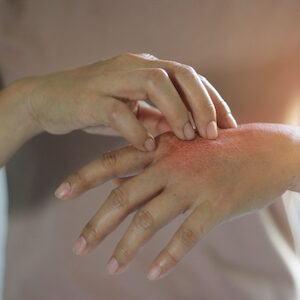Can Skin Cancer Itch?
- Posted on: Nov 30 2022

Itchy skin is a common problem that can be difficult to diagnose on your own. Sometimes, it’s nothing more than a minor annoyance – scratch the itch, and you’re done. Other bouts of itching are more persistent but relatively harmless, from dry skin to insect bites to mild allergic reactions.
Itchy skin can also be a warning sign of skin cancer, so it’s important to know the difference between your basic itch and when it means something more. The skin experts at Asarch Dermatology are here to help.
When is itching a sign of skin cancer?
Pain and tenderness are more frequently associated with skin cancer than itchy skin. But cancer can potentially irritate the fine nerve endings in your skin, causing an itching sensation.
Frequent itching could be a sign of skin cancer when it’s accompanied by:
• A new skin growth or lesion
• Any changes in an existing mole’s color or shape
• A sore that continually crusts over but doesn’t heal
• A pink, pearly bump that bleeds easily
• A rough or scaly patch of skin
Therefore, it’s best to discuss any new, changing, or unusual rashes or spots with your Asarch dermatologist right away.
What types of skin cancer can cause itching?
Squamous cell carcinoma
When itching is linked to skin cancer, the cancer could be squamous cell carcinoma – a common type of skin cancer that usually develops from pre-cancerous growths on your skin. Anyone can get squamous cell carcinoma, but you’re at greater risk if you:
• Have fair skin
• Seldom wear sunscreen or sun-protective clothing
• Have a history of sunburns
• Use indoor tanning beds
• Had an organ transplant
Squamous cell carcinoma tends to appear on areas that get a lot of sun exposure, such as the face, lips, scalp, shoulders, ears, or hands. Squamous cell carcinoma grows slowly but can also grow deep within your skin, causing the cancer cells to spread. Therefore, early detection and treatment are vital.
Basal cell carcinoma
Itching can also be a sign of basal cell carcinoma. Basal cell carcinoma is the most common type of cancer in the world, affecting about 2 million Americans each year. Although it’s most common in people with fair skin, people of all skin types and colors get basal cell carcinoma.
The primary causes of basal cell carcinoma are sun exposure and the use of indoor tanning beds. In fact, using a tanning bed just once increases your risk of developing basal cell carcinoma by nearly 30%. Having sun-sensitive skin that burns and freckles easily also puts you at greater risk.
For most people, basal cell carcinoma is not life-threatening and rarely spreads to other parts of the body. However, early detection and treatment are still important.
What types of rashes or spots are actually skin cancer?
There are many types of pre-cancerous and cancerous rashes and spots that your Asarch dermatologist can identify and treat. Examples include actinic keratosis (crusty or scaly bumps that appear on sun-exposed skin), actinic cheilitis (crusty or scaly bumps on your upper lip), and cutaneous horns (horn-like growths that often emerge from pre-cancerous and cancerous spots). Certain rashes and spots can develop into squamous cell carcinoma if they aren’t promptly removed.
What does a cancerous rash look like?
Cancerous rashes and growths vary in appearance. For instance, squamous cell carcinoma often crusts or bleeds and can appear as:
• A wart-like growth
• A scaly red or pink patch with irregular borders (may bleed easily)
• A raised growth with a rough surface and an indentation in the center
Basal cell carcinoma often appears as one or more of the following:
• A shiny red, pink, white, or translucent bump
• A reddish, raised patch that crusts or itches (but does not hurt)
• A pink growth with an elevated border and crusted indentation in the center
• A scar-like white, yellow, or waxy area (often with a poorly-defined border)
An open sore that crusts, oozes, or bleeds for weeks can also be a sign of squamous or basal cell carcinoma.
How can you tell if a rash is serious?
Talking with your Asarch dermatologist is the best way to find out if you have a non-cancerous rash or something that needs to be biopsied. If you have any of these symptoms with your rash, contact us immediately:
• You have a fever
• The rash appears suddenly and spreads quickly
• The rash is all over your body
• The rash is painful, begins to blister, or looks infected
Schedule an appointment today
Is your skin trying to tell you something? If you suddenly begin itching or notice a suspicious mark on your skin that’s changing in any way (such as size, shape, or color), you should never ignore it. We treat patients of all ages, so schedule an appointment with the skin experts at Asarch Dermatology today.
Posted in: Blog Post, Skin Cancer
